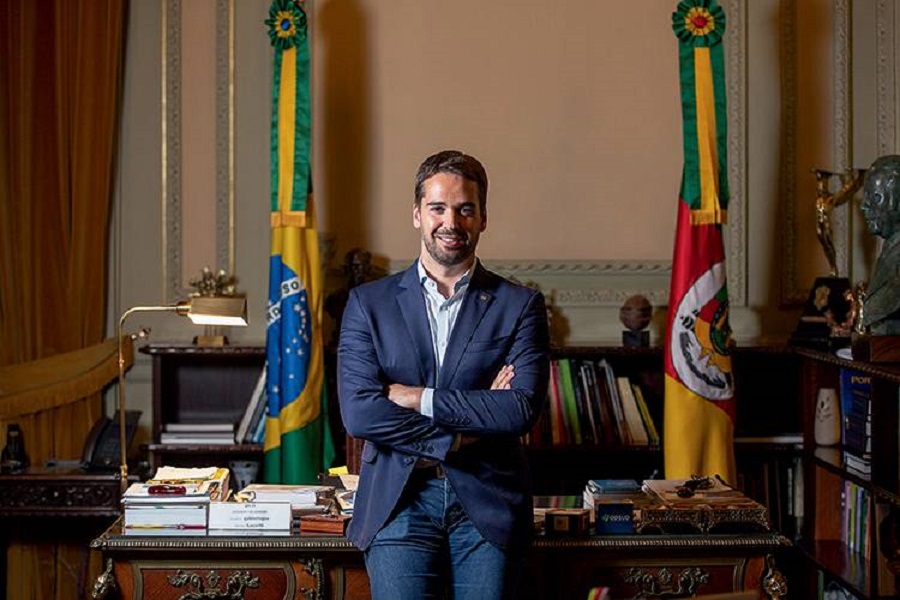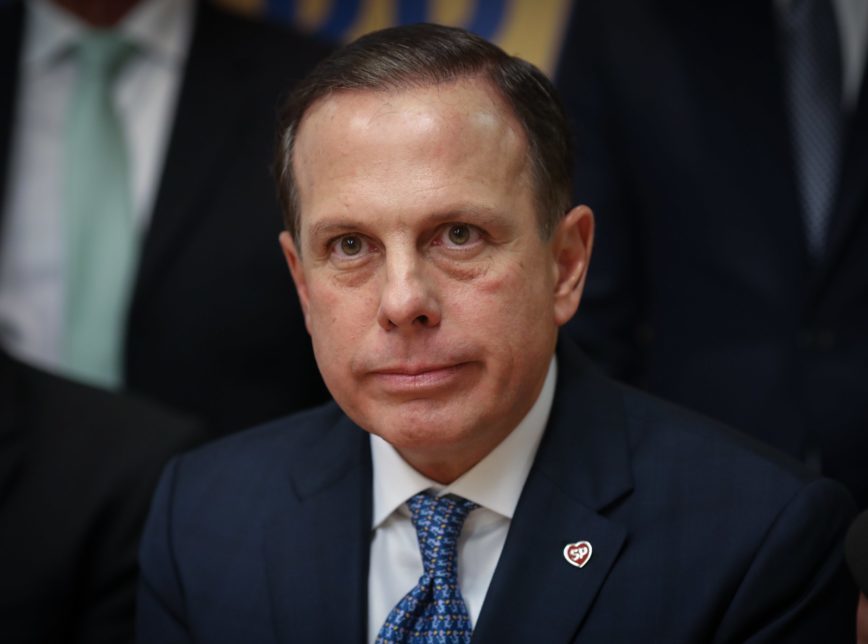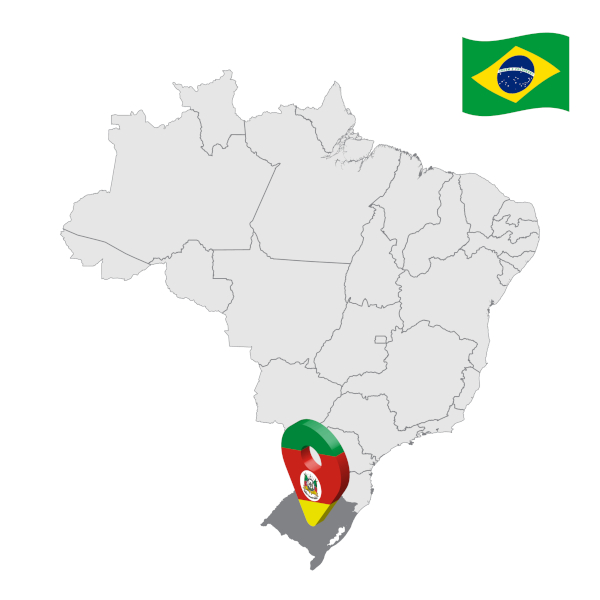RIO DE JANEIRO, BRAZIL – A politician with a career spanning almost two decades, despite being only 36 years old, Eduardo Leite (PSDB, Brazilian Social Democracy Party) had never mentioned his sexual orientation until he was the target of homophobic attacks during the 2018 campaign.
At the time he was forced to refute a fake news story that portrayed one of his brothers as an alleged boyfriend in a grossly manipulated photo. But it was not until three years later, in early July 2021, that he publicly declared his homosexuality in a nationally televised interview.
The announcement occurred in parallel with his decision to declare his pre-candidacy for the presidency as the PSDB nominee, which will be disputed in the party’s primary election scheduled for November 21.

Journalist Pedro Bial’s program was chosen for the disclosure, ten minutes into the interview recorded on the afternoon of June 1 in a hotel in São Paulo, when the host asked the candidate what was his trump card in relation to São Paulo governor João Doria – also a PSDB pre-candidate in the primary election.
“Integrity,” he answered. And he added: “I’ve never talked about a subject that I want to bring up on the show, which has to do with my private life and that was not a subject until now because we should discuss more what we can do in politics, and not exactly what we are or are not. I am gay. And I am proud of that.”
The announcement was far from a surprise for Bial, who had already set aside a reproduction of the fake news from the 2018 campaign to illustrate the interview. But it was a decision known to few, in harmony with the governor’s discreet -and centralizing- style: in addition to Communication Secretary Tânia Moreira, who joined him in his agenda in São Paulo and discussed it with the journalist. Only the family had been informed a week earlier about the disclosure. Not even PSDB chairman Lucas Redecker had been advised.
“I know that he had been thinking about it for some time, but I don’t know who could have told him to disclose it at this time,” Redecker assures. “It was a way for him to bury this issue once and for all,” the party leader believes. Leite’s friend since 2008, when the current governor was elected city councilor in Pelotas, in the far south of the state, the PSDB leader describes him as “very serious and upright,” in addition to being loyal to his principles. “He won’t abandon this, regardless of whether he wins or loses a dispute,” he explains.
The rehearsed move also included a growing distancing from president Jair Bolsonaro, for whom Leite declared his vote in 2018. Target of the president’s wrath, who accuses him of benefiting from federal government transfers during the pandemic, the governor brought Bolsonaro before the Federal Supreme Court (STF) in April to explain allegations that he had embezzled funds intended to fight Covid-19 in the state. The statements also involved homophobic insinuations.
To critics who insist on associating him with Bolsonaro, the governor has repeatedly said that choosing the president was the only possible option in the 2018 electoral scenario, in order to prevent the return of Lula da Silva’s far-left PT (Worker’s party) to power.
“In 2018 what I did was declare my vote for him, with many reservations. And even so, I recognize that I made a mistake,” Leite posted on Friday on social media. However, the mea-culpa is recent: in July last year, in an interview on TV Cultura’s Roda Viva show, the governor declared that the far-right politician promoted the country’s division, but that he did not regret having voted for him.
Even now, the governor is far from seeking a complete clash with the president, in order to prevent falling out with his conservative base. On Saturday, when Bolsonaro held a motorcycle rally in Porto Alegre, Leite backed the police who detained a woman banging pots in opposition to the president. “I voted for Bolsonaro in 2018 and I admit I made a mistake. The demonstrator arrested today admits she was out of line.”
Dispute within the PSDB
The change of course is focused on convincing the PSDB membership that Leite can be the third option for the candidacy desired by the party leadership and other leaders of the so-called democratic center.
The first step was to change the party’s primary rules, joining Senator Tasso Jereissati and ex-senator Arthur Virgílio Neto (also pre-candidates in the November 21 prelims), in order to neutralize Doria’s power over the mass of affiliates, estimated at around 1.3 million voters. Included in the list were the party’s mayors and deputy mayors nationwide (about 600 politicians), the over 4,000 PSDB city councilors, and about 100 state deputies, as well as senators and governors.
The affiliates now hold only 25% of the PSDB’s electoral college. The tactic was seen as a major defeat for the governor of São Paulo.

The second step was presenting Leite as a brave and modern manager, as well as young – a millennial, willing to declare himself gay and seek right-wing voters. The showcase is the Rio Grande do Sul government, surprisingly conquered by a politician who, until then, had only been a city councilor and mayor of Pelotas, a mid-sized city in the state.
“His great advantage is his ability to dialogue with everyone, to unite, to converge. Leite did not choose a disruptive government in Rio Grande do Sul, on the contrary. But neither did he complain about the challenges, especially the lack of money. Of all the governors in Brazil, he was the one who carried out the most structural reforms,” Redecker claims.
However, the task of facing Doria is not that simple. Leite has no political influence in the party, is little known nationally, and has few allies, even among the PSDB leaders: in addition to ex-president Fernando Henrique Cardoso, he is supported by senator Rodrigo Cunha (AL) and federal deputies Adolfo Viana (BA), Paulo Abi-Ackel (MG) and Rodrigo de Castro (MG).
He is also a friend of Aécio Neves, who traveled to Pelotas four times during Leite’s mayoral campaign in 2012. A card he seems willing to play is his low rejection rate: little known, Leite would have room to build a candidacy, to be a kind of surprise effect in the dispute.
One of his most deeply-rooted mottos is the anti-PT ideology. This was the motivation that led him to support Bolsonaro in the second round against Fernando Haddad (PT) in 2018. It was constrained support, given the president’s contumacious homophobia.
But it was necessary to win the race for the state, since his opponent, José Ivo Sartori (MDB), presented himself as Bolsonaro’s official representative in Rio Grande do Sul, attracting the support of voters from Rio Grande do Sul’s most conservative wing. The victory came with a little more than 400,000 votes difference, in a close second round.
Ambition
The governor’s political background comes from his father, José Luis Marasco Cavalheiro Leite, an attorney and teacher from Pelotas with origins in the old MDB linked to socialism and the fight against the dictatorship. But he ultimately followed the path of his friend, the then sociologist and professor Fernando Henrique Cardoso. Founder of PSDB in the city in the late 1980s, Marasco ran for mayor in 1988 in an alliance with leftist parties PCdoB and PCB. He won less than 2% of the vote. He has since dropped out of party politics.
At the time, Leite was little more than a toddler, but it was enough for him eventually to register as a voter and join the same party as his father when he turned 16 in 2001. In 2004 he ran for the City Council for the first time at the age of 19, and was elected assemblyman.

As governor, Leite pledged to maintain the constitutional requirement for a plebiscite to authorize the privatization of important state companies, such as the Sanitation Company (Corsan), the data processing company (Procergs) and the state bank (Banrisul). But in 2020, he submitted a constitutional amendment proposal (PEC) to the Rio Grande do Sul Legislative Assembly, overturning the referendum requirement. The proposal was passed in June this year by the Rio Grande do Sul state assembly.
The Assembly had also overturned a constitutional rule providing for a popular consultation for the privatization of the electricity (CEEE), mining (CRM), and gas (Sulgás) companies in 2019, also at the governor’s behest. The CEEE-D, which provides energy distribution to over 300 Rio Grande do Sul municipalities, was sold in March for the symbolic price of R$100,000 (US$19,000) – the buyer assumed liabilities worth R$4.4 billion in ICMS, of which it will pay R$1.7 billion over 15 years. The remainder will be paid by the government.
“Buying an energy company that operates under a concession regime is like a marriage, and it means that you believe in our economy,” Leite said in the ceremony that formalized the concession.
Another campaign commitment that Leite has not yet been able to fully accomplish is to pay the salaries of the state’s civil servants, as promised during his first year in office. The measure was put into practice in November 2020, almost two years after Leite took office. It was 57 months of installment payments, 23 of which during the current governor’s administration.
“Paying on time is an obligation of the state, not a favor. Our structural reforms are the basis of the fiscal adjustment that enabled the resumption of timely payment in November 2020,” he said in April.
The administrative and pension reform, passed in 2020, is one of the trump cards in Leite’s portfolio to qualify for the PSDB nomination to the presidency. By projecting savings amounting to R$18.7 billion in 10 years, of which R$13.9 billion in Social Security, the Government increased the retirement rates to a 22% cap, eliminated bonus leave, excluded job bonuses from future retirements, and limited the participation of civil servants in union mandates, saving R$600 million a month in payrolls, according to the government.
Leite’s conciliatory capacity, highlighted by the leader of the Rio Grande do Sul PSDB, also secured a large majority in the Legislative Assembly for the approval of constitutional reform bills, including the MDB and PP -which did not support him in the second round of the 2018 elections. Together with the PTB, the party of vice-governor Ranolfo Vieira Júnior, the range of alliances, depending on the issue, may reach 40 deputies in a universe of 55 legislators.
Celebrated by politicians from right to left for having publicly disclosed his homosexuality, and for taking a stand against homophobia and intolerance, Eduardo Leite has been dedicated to demonstrating his willingness to dialogue with opponents and more famous critics, such as Youtuber Felipe Neto, who ruled out supporting him in a national dispute because of his former alliance with the president.
“We will overcome this mistake [the 2018 support] with dialogue, including with those who think differently. You don’t fight hate with intolerance,” he wrote. He also recently posted an excerpt from the latest song by Uruguayan musician Jorge Drexler, La guerrilla de la concordia, with the hashtag #oamorvaivenceroodio (lovewillbeathate). The song states that love is for the brave. And that hate is the cowards’ compass.
With information of El Pais

